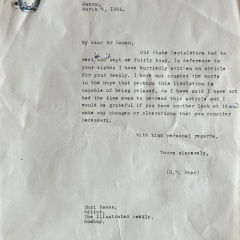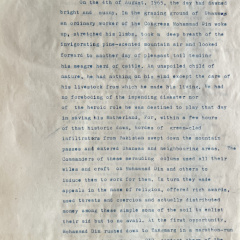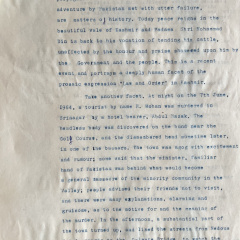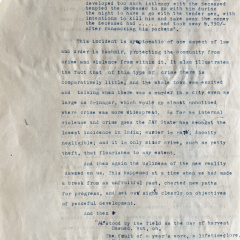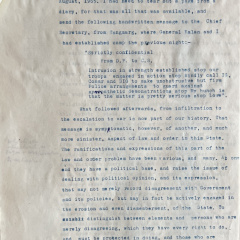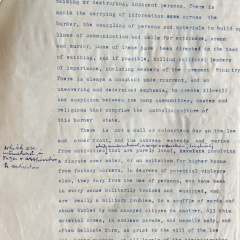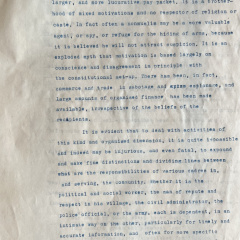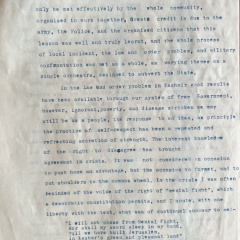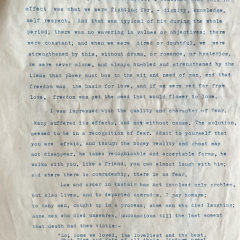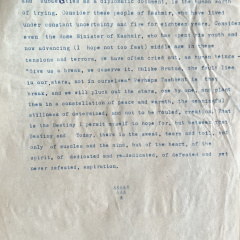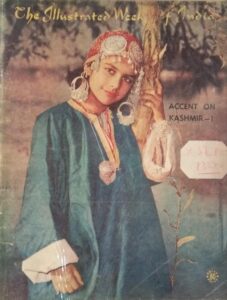
Illustrated Weekly Cover, 20 March 1966
This article for Illustrated Weekly’s issue of 20 March 1966 was written by D.P. Dhar while he was Home Minister of Jammu and Kashmir. A copy of the article was found among his private papers.
On the 4th of August, 1965, the day had dawned bright and sunny. In the grazing ground of Dhanwas an ordinary worker of the Congress Mohammad Din woke up, stretched his limbs, took a deep breath of the invigorating pine-scented mountain air and looked forward to another day of pleasant toil tending his meagre herd of cattle. An unspoiled child of nature, he had nothing on his mind except the care of his livestock from which he made his living. He had no foreboding of the impending disaster nor of the heroic role he was destined to play that day in saving his Motherland. For, within a few hours of that historic dawn, hordes of green-clad infiltrators from Pakistan swept down the mountain passes and entered Dhanwas and neighbouring areas. The Commanders of these marauding columns used all their wiles and craft on Mohammad Din and others to induce them to work for them. In turn they made appeals in the name of religion, offered rich awards, used threats and coercion and actually distributed money among these simple sons of the soil to enlist their aid but to no avail. At the first opportunity, Mohammad Din rushed down to Tangmarg in a marathon-run
and informed the State CID contact there of the presence of enemy on our land and with characteristic disdain flung down the money given to him by the enemy for betraying his country. How this information given by this patriot was flashed to me at Srinagar, how the State Government reacted with lightening speed, how the Army mobilised its forces, how the infiltrators’ columns were engaged and dispersed long before they could reach Srinagar, how the people of the State remained calm and undisturbed in spite of enemy propaganda and how this entire ignominious adventure by Pakistan met with utter failure, are matters of history. Today peace reigns in the beautiful vale of Kashmir and Padama Shri Mohammad Din is back to his vocation of tending his cattle, unaffected by the honour and praise showered upon him by the Government and the people. This is a recent event and portrays a deeply human facet of the prosaic expression “Law and Order” in Kashmir.
Take another facet. At night on the 7th June, 1964, a tourist by name R. Mohan was murdered in Srinagar by a hotel bearer, Abdul Razak,.The headless body was discovered on the bund near the Gold Course, and the dismembered head sometime later, in one of the bazaars. The town was agog with excitement and rumour; some said that the sinister, familiar hand of Pakistan was behind what would become a general massacre of the minority community in the Valley: people advised their friends not to visit and there were many explanations, alarming and gruesome, as to the motive for and the meaning of the murder. In the afternoon, a substantial part of the town turned up, and lined the streets from Nedous Hotel onwards to the Dalgate Bridge, to watch the dogs chase “the scent” for the criminal. They never had a dogs chance, as the shouting and the excitement, the encouragement and the diversions, provided by the spectators made the sustained pursuit of any scent quite impossible, but the town had had a good afternoon’s entertainment, and everyone went home relaxed, and full of theories. The criminal was traced within two days, and the police report summed up the motive in characteristic language:-
“The accused had gained much confidence of the deceased who did nothing whatever without the consent of the accused. The accused having developed too much intimacy with the deceased tempted the deceased to go with him during the night to have a go with the tender sex, with intentions to kill him and take away the money the deceased had… and took away Rs. 390/after ransacking his pockets”.
This incident is symptomatic of one aspect of law and order in Kashmir, protecting the community from crime and violence from within it. It also illustrates the fact that of this type of crime there is comparatively little, and the whole town was excited and talking when there was a murder in a city even as large as Srinagar, which would go almost unnoticed where crime was more widespread. As far as internal violence and crime goes the J&K State has amongst the lowest incidence in India; murder is rare; dacoity negligible; and it is only minor crime, such as petty theft, that flourishes to any extent.
And then again the ugliness of the new reality dawned on us. This happened at a time when we had made a break from an unfruitful past, charted new paths for progress, and set our sights clearly on objectives of peaceful development.
And then,
“ He stood by the field as the day of harvest
Dawned. But, oh,
The fruit of a year’s work, a lifetimeslore,
Had ceased to grow.
No wickedest weather could thus have turned,
As it were overnight.
His field to so wan and weedy a showing:
Some galloping blight
From earth’s metabolism must have sprung
To ruin all;
Or perhaps his own high hopes had made
The wizened look tall.
But it’s useless to argue the why and wherefore,
When a crop is so thin,
There’s nothing to do but to set the teeth
And plough it in.”
This was the early morning of the 6th of August, 1965. I had need to tear out a page from a diary, for that was all that was available, and send the following handwritten message to the Chief Secretary, from Tangmarg, where General Kalan and I had established camp the previous night:
“Strictly confidential
From D.P. to C.S.
Intrusion in strength established stop our troops engaged in action stop kindly call IG, Commr and DIG to make unobtrusive but firm Police arrangements to guard against sympathetic demonstrations stop My hunch is that the matter is pretty serious stop Love.”
What followed afterwards, from infiltration to the escalation to war is now part of our history. That message is symptomatic, however, of another, and much more sinister, aspect of law and order in this State. The ramifications and expressions of this part of the Law and order problem have been various, and many. At one end they have a political base, and raise the issue of dealing with political opinion, and its expression, that may not merely record disagreement with Government and its policies, but may in fact be actively engaged in the erosion and even dismemberment, of the State. To distinguish between elements and persons who are merely disagreeing, which they have every right to do, and must be protected in doing, and those who are diabolically using a constitutional right as a cloak and platform for destroying the State, is a most difficult and delicate matter of judgment. Another facet of the problem is the many forms of sabotage that have been practised, ever since the 1949 ceasefire, varying from the comparatively open raids, murder and constant pressure in border villages, to the bursting of time-bombs and other incendiary materials in cinemas, buses, near the Legislature at places of worship, and elsewhere, designed to create panic, and often successful in maiming or destroying, innocent persons. There is again the carrying of information across the border, the smuggling of persons and materials to build up lines of communication and cells for espionage, arson and murder. Some of these have been directed to the task of watching, and if possible, killing political leaders of importance, including members of the present Ministry. There is always a constant undercurrent, and an unwavering and determined emphasis, to create ill-will and suspicion between the many communities, castes and religions that comprise the catholic culture of this border state.
There is not a dull or colourless day on the law and order front, and the canvas extends and varies from activities which are international in origin and inspiration, to activities that are purely local, involving a dispute over water, or an agitation for higher bonus from factory workers. In degrees of potential violence also, they vary from the use of persons, who have been in every sense militarily trained and equipped, and are really a military problem, to a scuffle of words and abuse hurled by one annoyed citizen to another. All this material comes, in endless parade, and usually ugly, and often delicate form, as grist to the mill of the law and order machine, at all levels of the administration.
I do not propose to describe various incidents, or attempt any history, but to draw from experience certain impressions and conclusions that the impact of this situation has made.
First, and most important, is the fact that subversive and murderous activity is by no means the monopoly of one community. We have plenty of evidence of persons from all communities engaged in the process and fruits of sabotage, The ‘fruits’ may vary. One man may be doing it possibly, though this is rare, for reasons of conscience; another for earning a larger, and more lucrative pay packet. It is a brotherhood of mixed motivations and no respecter of religion or caste. In fact often a non-Muslim may be a more valuable agent, or spy, or refuge for the hiding of arms, because it is believed he will not attract suspicion. It is an exploded myth that motivation is based largely on conscience and disagreement in principle with the constitutional set-up. There has been, in fact, commerce and trade in sabotage and espionage, and large amounts of organised finance has been made available, irrespective of the beliefs of the recipients.
It is evident that to deal with activities of this kind and organised dimension, it is quite impossible and indeed may be injurious, and even fatal, to expound and make fine distinctions and dividing lines between what are the responsibilities of various cadres in, and serving, the community. Whether it is the political and social worker, the man of repute and respect in his village, the civil administrator, the police official, or the army, each is dependent, in an intimate way on the other, particularly for timely and accurate information, and often for more specific physical needs, like guiding, and the provision of labour in difficult forest and hill terrain. It is that perhaps as a result of this experience of many year that in Kashmir each cadre has held the others in respect and valued, and considered opinion and data has been made available for the common pool. This paid good dividends in the 1965 crisis, and adverse results were crucial and sharp, where cooperation and inter-dependence had not been achieved in practice. Infiltration particularly, is not only a military effort but is a social process, and can only be met effectively by the whole community, organised to work together. Great credit is due to the army, the Police, and the organised citizens that this lesson was well and truly learnt, and the whole process of local incident, the law and order problem, and military confrontation was met as a whole, as varying themes on a single orchestra, designed to subvert the State.
In the Law and Order problem in Kashmir good results have been available through our system of free Government, however, ignorant, poverty, and disease stricken we may still be as a people, the response to an idea, a principle, the practice of self-respect has been a repeated and refreshing accretion of strength. The inherent knowledge of the right to disagree has brought agreement in crisis. It was not considered an occasion to push home an advantage, but the occasion to forget, and to put shoulders to the common wheel. In the crisis I was often reminded of the value of the right of “mental fight”, which a democratic constitution permits, and I quote, with one liberty with the text, what was of continual succour to me:-
“I will not cease from Mental Fight,
Nor shall my sword sleep in my hand,
Till we have built Jerusalem,
In Kashmr’s green and pleasant land”
(Blake – ‘Kashmir’ is substituted for ‘England’.)
Nor can I let the occasion pass, without acknowledging, that in a situation where motives and meanings were apt to be difficult, judgment apt to be either too sentimental or too stern, the light of reason difficult to find in the hurricane of violence, fear and uncertainty, the fact of the immense certainty, strength and security of good leadership. In the 1965 crisis we had these from Chief Minister Sadiq. I was irritated beyond measure, entering his room one day, at the height of the crisis, to find a cool and time consuming discussion in process about the preservation of certain books for the Archives. And yet, in retrospect, I realised that this in effect was what we were fighting for, – dignity, knowledge, self respect. And that was typical of him during the whole period; there was no wavering in values or objectives; there were constant; and when we were tired or doubtful, we were strengthened by this, without drama, or romance, or hysterics. We were never alone, and always humbled and strengthened by the ideas that power must bow to the wit and need of man, and that freedom was the basis for love, and if we were yet far from love, freedom was yet the seed that would flower to love.
I was impressed with the quality and character of fear. Many suffered its effects, and not without cause. The solution, seemed to be in a recognition of fear. Admit to yourself that you are afraid, and though the bogey reality and ghost may not disappear, he takes recognisable and acceptable forms, he walks with you, like a friend; you can almost laugh with him; and where there is comradeship, there is no fear.
Law and order in Kashmir has not involved only problem, but also lives, and to departed comrades, I pay homage; to many men, caught up in a process; some men who died laughing; some men who died unawares, unconscious till the last moment that death had them victim:-
“Lo! Some we loved, the loveliest and the best,
That Time and Pate of all their Vintage prest,
Have drunk their cup a Round or two before,
And one by one crept. silently to rest.”
(Omar Khayam)
But also to the living, particularly to those who lived on a platform that never considered or accepted defeat. ‘Srinagar is surrounded, the town will go up in flames’ we were told on August 9th. And I was recalled to sanity by a colleague. “Towns do not expire thus briefly; the town will live; let us save ourselves from the flames by giving it life.”
And now – Tashkent, intimately and we hope constructively and remedially, linked with the future of law and order in Kashmir. Apart from any debate regarding its possibilities and subtleties as a diplomatic document, is the human worth of trying. Consider these people of Kashmir, who have lived under constant uncertainty and fire for eighteen years. Consider even the Home Minister of Kashmir, who has spent his youth and now advancing (I hope not too fast) middle age in these tensions and terrors. We have often cried out, as human beings –
“Give us a break, we deserve it. Unlike Brutus, the fault lies in our stars, not in ourselves.” Perhaps Tashkent is that break, and we will pluck out the stars, one by one, and plant them in a constellation of peace and warmth, the meaningful stillness of determined, and not to be fouled, creation. That is the Destiny I permit myself to hope for, but between that Destiny and Today, there is the sweat, tears and toil, not only of muscles and the mind, but of the heart, of the spirit, of dedicated and re-dedicated, of defeated and yet never defeated, aspiration.
